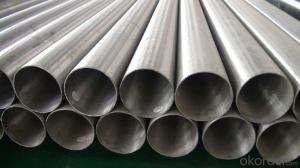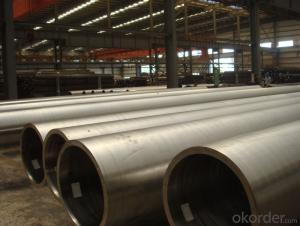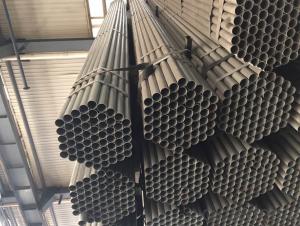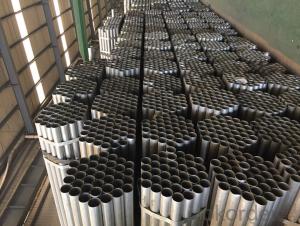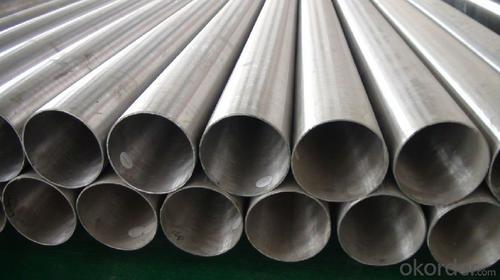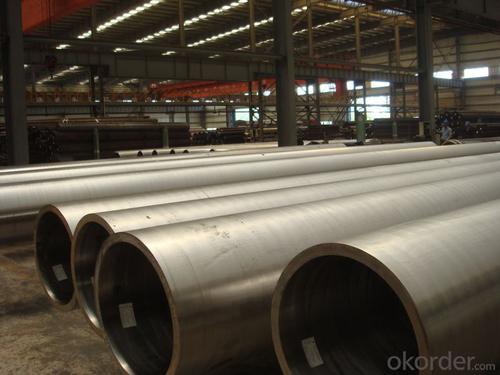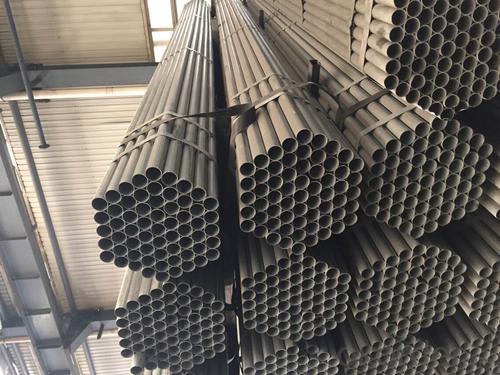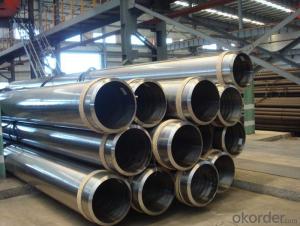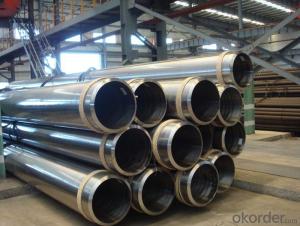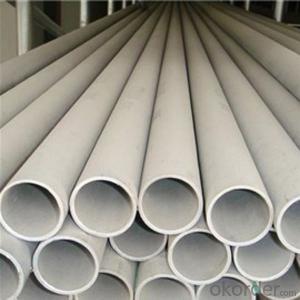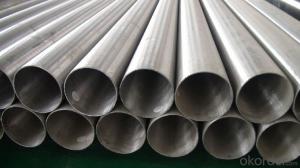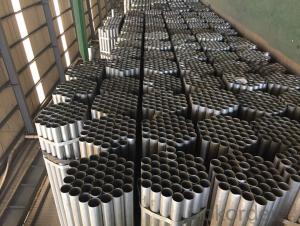Stainless Steel Welded Pipe ASTM A312/A316/A358
- Loading Port:
- Tianjin
- Payment Terms:
- TT or LC
- Min Order Qty:
- 30 m.t.
- Supply Capability:
- 10000 m.t./month
OKorder Service Pledge
OKorder Financial Service
You Might Also Like
1、Structure of Stainless Steel Welded Pipe ASTM A358/A312/A316 Description:
Stainless steel welded pipe is actually a cover term, covering a wide range of alloy and making them suitable for different attributes that are used in a very wide and large numbers of different industries. Stainless steel pipe is resistant to erosion, highly flexible, powerful, easy to use, and can be done in distinct approaches, which means that more and more stainless steel was used as a construction material for large-scale, high impact buildings. It can be molded, rolling, and it can create amazing shapes to make it perfect, It is used as experimental buildings, The use of steel pipe welding of large stainless steel covers other examples.
2、Main Features of the Stainless Steel Welded Pipe ASTM A358/A312/A316:
• High manufacturing accuracy
• High strength
• Small inertia resistance
• Strong heat dissipation ability
• Good visual effect
•Reasonable price
3、Stainless Steel Welded Pipe ASTM A358/A312/A316 Images:
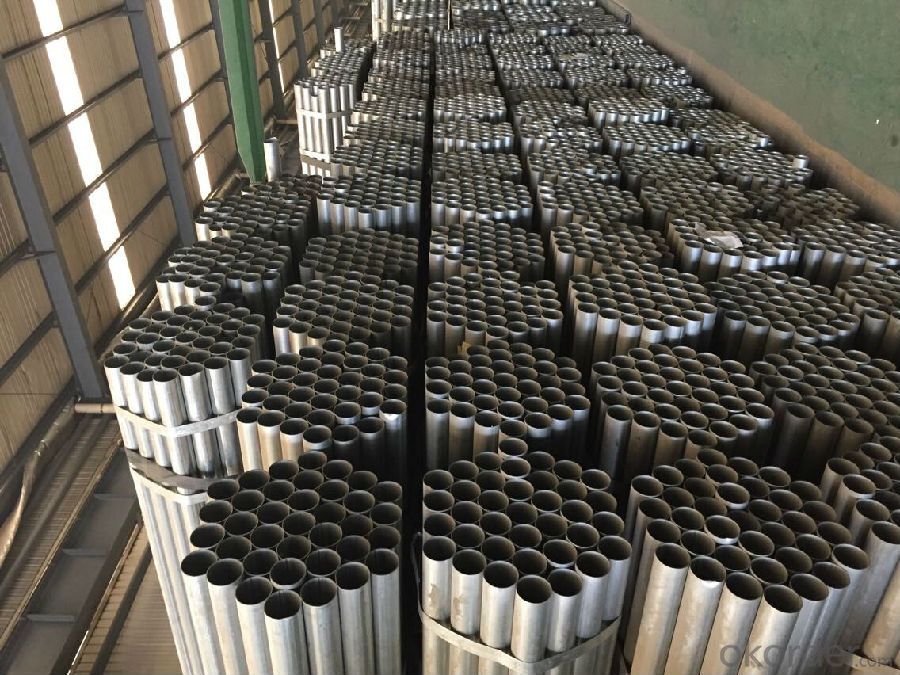
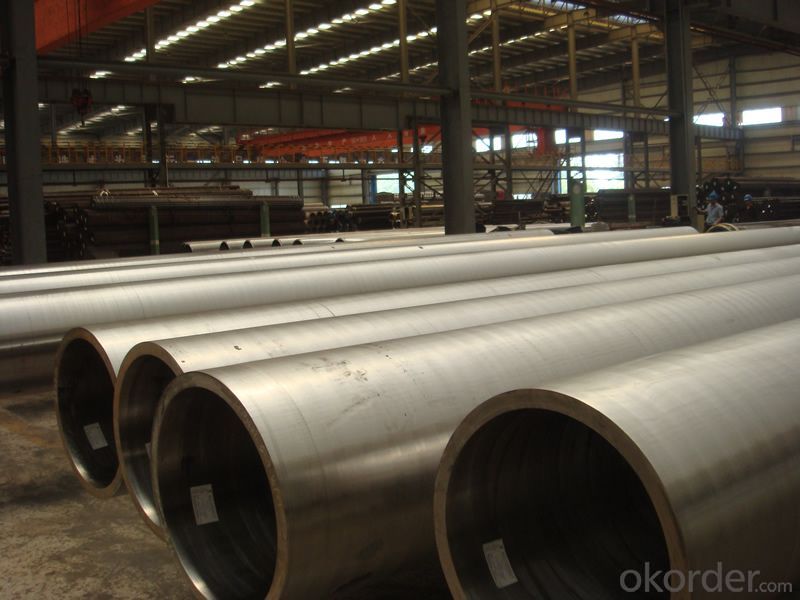
4、Stainless Steel Welded Pipe ASTM A358/A312/A778 Specification:
Size:
| Outside diameter | Outside | Thickness | ||||
| SCH 5S | SCH 10S | SCH 20S | SCH 40S | |||
| (A) | (B) | mm | mm | mm | mm | mm |
| 350 | 14′ | 355.6 | 3.96 | 4.78 | 7.92 | 11.13 |
| 400 | 16′ | 406.4 | 4.19 | 4.78 | 7.92 | 12.7 |
| 450 | 18′ | 457.2 | 4.19 | 4.78 | 7.92 | 14.27 |
| 500 | 20′ | 508 | 4.78 | 5.54 | 9.53 | 15.09 |
| 550 | 22′ | 558.8 | 4.78 | 5.54 | 9.53 | 15.09 |
| 600 | 24′ | 609.6 | 5.54 | 6.35 | 9.53 | 17.48 |
| 650 | 26′ | 660.4 | 5.54 | 7.92 | 12.7 | 17.48 |
| 700 | 28′ | 711.2 | 5.54 | 7.92 | 12.7 | 17.48 |
| 750 | 30′ | 762 | 6.35 | 7.92 | 12.7 | 17.48 |
| 800 | 32′ | 812.8 | 7.9 | 12.7 | 17.48 | |
| 850 | 34 | 863.6 | 7.92 | 12.7 | 17.48 | |
| 900 | 36′ | 914.4 | 7.92 | 12.7 | 19.05 | |
| 1000 | 40′ | 1016 | 9.53 | |||
Tolerances on dimensions table:
| Tolerances on dimensions table: | ||||
| Standard | Outside(mm) | Thickness(mm) | Length(mm) | |
| ASTM A312 | ≤48.26 | -0.4 | +No special provisions(Unspecified)-12.50% | Appoint LengthDefinite cut length+6.40 |
| >48.26~114.30 | 0 | 0 | ||
| >114.30~219.08 | 0.8 | |||
| >219.08~457.20 | 1.6 | |||
| >457~660 | -4 | |||
| >660~864 | -5 | |||
| >864~1219 | -5.6 | |||
| JIS G3459 | <30.00 ±0.30≥30.00 ±1.00% | <2.00 ±0.20≥2.00 ±10% | Appoint LengthDefinite cut Length | |
| GB/T 12771 | <13.00 ±0.2013.00~40.00 ±0.30≥40.00 ±0.80% | ≤4.00 +0.50 -0.60>4.00 ±10% | 20 | |
| EN 10217-7 | D1±1.50% with±0.75mm(min)D2±1.00% with±0.50mm(min)D3±0.75% with±0.30mm(min) | T1±15.00% with±0.60mm(min)T2±12.5% with±0.40mm(min)T3±10.00% with±0.20mm(min) | ≤6000 +5.00 -06000~12000 +10.00 -0 | |
| D4±0.5% with±0.10mm(min) | T4±7.50% with±0.15mm(min) | |||
| T5±5.00% with±0.10mm(min) | ||||
| EN ISO 1127 | ||||
5、FAQ of Stainless Steel Welded Pipe ASTM A358/A312/A778:
①How is the quality of your products?
Our products are manufactured strictly according to national and internaional standard, and we take a test on every pipe before delivered out. If you want see our quality certifications and all kinds of testing report, please just ask us for it.
Guaranteed: If products’ quality don’t accord to discription as we give or the promise before you place order, we promise 100% refund.
②Why should you chose us?
Chose happens because of quality, then price, We can give you both.Additionally, we can also offer professional products inquiry, products knowledge train(for agents), smooth goods delivery, exellent customer solution proposals.Our service formula: good quality+good price+good service=customer’s trust
SGS test is available, customer inspection before shipping is welcome, third party inspection is no problem.
Any question, pls feel free to contact us !
- Q: How are steel pipes used in tunnel construction?
- Steel pipes are used in tunnel construction as structural elements to provide support and stability to the tunnels. They are commonly used in tunnel lining systems to create a strong and durable structure that can withstand the pressure and weight of the surrounding soil or rock. Steel pipes are also used for ventilation systems, drainage systems, and for carrying utilities such as water, gas, or electricity through the tunnel.
- Q: How are steel pipes recycled?
- Steel pipes are recycled through a multi-step process that involves collection, sorting, cleaning, and melting. First, the used steel pipes are gathered from various sources such as construction sites or industrial facilities. Then, they are sorted based on their size, shape, and quality. Next, any contaminants or coatings are removed from the pipes through cleaning and stripping processes. Finally, the cleaned pipes are melted down in a furnace, and the molten steel is formed into new pipes or other steel products. This recycling process reduces the demand for new raw materials and helps conserve energy and resources.
- Q: What are the lengths of scaffold steel tubes?
- Scaffolding steel pipe standard length is 6 meters, for easy use, respectively, 6 meters, 3 meters, 2 meters, 1.5 meters, 1 meters, etc., if there is a special length, you need to intercept.
- Q: What is the difference between steel pipe and PVC pipe?
- Steel pipe is made from a combination of iron and carbon, giving it strength and durability. It is used for heavy-duty applications, such as plumbing and gas lines, as it can withstand high pressure and extreme temperature. On the other hand, PVC (polyvinyl chloride) pipe is a plastic pipe that is lightweight, easy to install, and resistant to corrosion and chemicals. It is commonly used for plumbing, irrigation, and drainage systems, but not suitable for high-pressure applications.
- Q: Are steel pipes suitable for underground irrigation pumping?
- Indeed, steel pipes prove to be a fitting option for underground irrigation pumping. Renowned for their robustness and resilience, steel pipes present themselves as an optimal selection for subterranean utilities. They boast the capacity to endure substantial pressure, ward off corrosion, and remain less susceptible to soil shifting or fluctuations in temperature. Moreover, steel pipes exhibit a lengthier lifespan when juxtaposed with alternative materials, thereby mitigating the necessity for frequent replacements. However, it remains imperative to guarantee meticulous coating or lining of the steel pipes to avert corrosion and to consistently examine and uphold them for their continued efficacy and durability.
- Q: Seamless steel tube with the tube with what is the difference?
- Seamed tube can withstand the maximum pressure is generally less than 20 kg, which is the most secure use. It is generally used in water, gas, compressed air and other low-pressure fluid;
- Q: Do steel pipes expand or contract with temperature changes?
- When the temperature increases, steel pipes undergo expansion, while they contract when the temperature decreases. This occurrence is due to the thermal expansion and contraction characteristics of steel, which are present in most materials. When steel pipes are heated, the molecules within the metal gain energy and vibrate more intensely, causing them to separate and increase in size. On the contrary, when the temperature of the steel pipes decreases, the molecules lose energy and move closer together, resulting in a reduction or shrinking in size. It is crucial to take into consideration these thermal expansion and contraction properties of steel pipes during their design and installation, as failure to accommodate these fluctuations might result in structural damage, leaks, or other complications.
- Q: Are steel pipes resistant to fire?
- Yes, steel pipes are highly resistant to fire.
- Q: What is the typical lifespan of steel pipes?
- The typical lifespan of steel pipes can vary depending on various factors such as the quality of the steel used, the environmental conditions, and the maintenance and usage of the pipes. However, on average, steel pipes are known to have a lifespan of around 50 to 100 years. With proper installation, regular inspections, and appropriate maintenance, steel pipes can often exceed this lifespan and provide reliable service for several decades. It is important to note that factors such as corrosion, erosion, and external damage can impact the lifespan of steel pipes, so it is crucial to implement preventive measures and necessary repairs to ensure their longevity.
- Q: What are the different types of supports used for underground steel pipes?
- There are several types of supports commonly used for underground steel pipes, including concrete cradles, saddle supports, and thrust blocks. These supports help distribute the weight and forces acting on the pipe, ensuring its stability and preventing damage.
Send your message to us
Stainless Steel Welded Pipe ASTM A312/A316/A358
- Loading Port:
- Tianjin
- Payment Terms:
- TT or LC
- Min Order Qty:
- 30 m.t.
- Supply Capability:
- 10000 m.t./month
OKorder Service Pledge
OKorder Financial Service
Similar products
Hot products
Hot Searches
Related keywords
